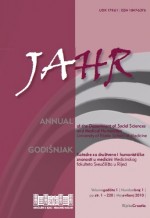From Nuremberg to UNESCO: informed consent to medical treatment or exam
Ključne riječi:
UNESCO, bioethics, patient’s consent, human dignity, autonomy, international law on human rightsSažetak
Th e informed consent to a medical treatment or participation in medical research is nowadays considered a fundamental standard of everyday practice and scientific research in medicine. However, accepting this standard, both in medical ethics and law, is not uniquely viewed upon in terms of its content or necessity. Starting from basic principles – human dignity and individual autonomy – UNESCO’s International Committee for Bioethics has offered in sketches of three bioethics declarations unique rules which must be followed in the applica-tion of this institute, and which were consequently adopted by consensus by all UNESCO state members. Following a short historical overview, this presentation examines the stan-dards of patients’ consent to a medical measure or exam contained in UNESCO’s bioethics declarations, namely: Universal Declaration on Human Genome and Human Rights, International Declaration on Human Genetic Data and Universal Declaration on Bioethics and Human Rights. The presentation will show that declarations hold only minimum standards that protect patients or participants in medical exams from self-willing treatment or research and that the authors of these documents missed the opportunity to set rigorous and explicit rules for the applications of this institute. However, bearing in mind that most countries’ domestic legal regulations are not sufficiently elaborated in regards with biomedicine and that the existing domestic laws differ in many aspects, the author shall show that the UNESCO’s bioethics declarations are a useful source and signposts for the domestic systems in defining ethical and legal regulations regarding biomedicine. Besides, even though these documents are not legally binding, one should bear in mind that declarations of this type are the first step towards the necessary protection of human rights with regards to biomedicine worldwide and they promote a new approach to solving bioethical dilemma based on the international law on human rights.
##submission.downloads##
Objavljeno
Broj časopisa
Rubrika
Autorska prava
Autori koji objavljuju u ovom časopisu slažu se sa slijedećim uvjetima:
- Autori zadržavaju autorska prava i dodjeljuju pravo časopisu na prvo objavljivanje uz istovremeno uvažavanje Creative Commons Attribution License koje omogućava drugima da dijele rad uz priznavanje njegova autorstva i početne objave u ovom časopisu.
- Autori mogu sklopiti zasebne, dodatne ugovorne dogovore o neekskluzivnoj distribuciji objavljene verzije rada (npr. objaviti ga u repozitoriju institucije ili ga objaviti u knjizi), uz priznavanje da je njegova početna objava bila u ovom časopisu.
- Autorima je dopušteno i ohrabruje ih se da objavljuju svoje radove putem društvenih mreža (npr. u repozitoriju institucije ili na njenim internetskim stranicama) prije i za vrijeme prijave obzirom da to može doprinijeti produktivnoj razmijeni te ranijeg i većeg citiranja objavljenog rada (Vidjeti: The Effect of Open Access).



